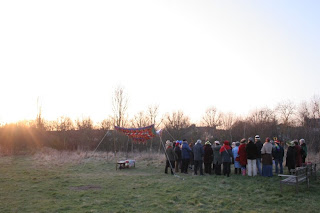 Last Friday I went to a Kew Wassail in aid of making the apricot tree fruitful for the year. It was very exciting because I also met a woman with a sheep, and another woman who has a spinning wheel - and knows how to use it - so I think it was a very fruitful occasion already.
Last Friday I went to a Kew Wassail in aid of making the apricot tree fruitful for the year. It was very exciting because I also met a woman with a sheep, and another woman who has a spinning wheel - and knows how to use it - so I think it was a very fruitful occasion already.AND I met a woman who keeps bees there (its called Pensford Fields and its a hidden gem of a kind of naturalness, behind some houses in Kew) and she wants help looking after the bees, so one day I might know enough to have my own honey. If there are any bees left, that is.

Anyway the Wassail is meant to be around Twelfth night, when we know we are safely through the dark Solstice, and its time to get things going again so we have food for next winter.
So we all pile down to the orchard and sing a song to the tree to ask it to be fruitful - and make it a toast - and make a lot of loud noise to chase away evil spirits ("and pollution" - maybe a reference to the pending expansion of Heathrow nearby), and wear silly clothes. The Mayor was there as well as the sheep and some nice local people.

Lets hope it works and the trees are Fruitful, and the bees come back, and then I will have plenty to talk about on this blog.

Comments
Post a Comment